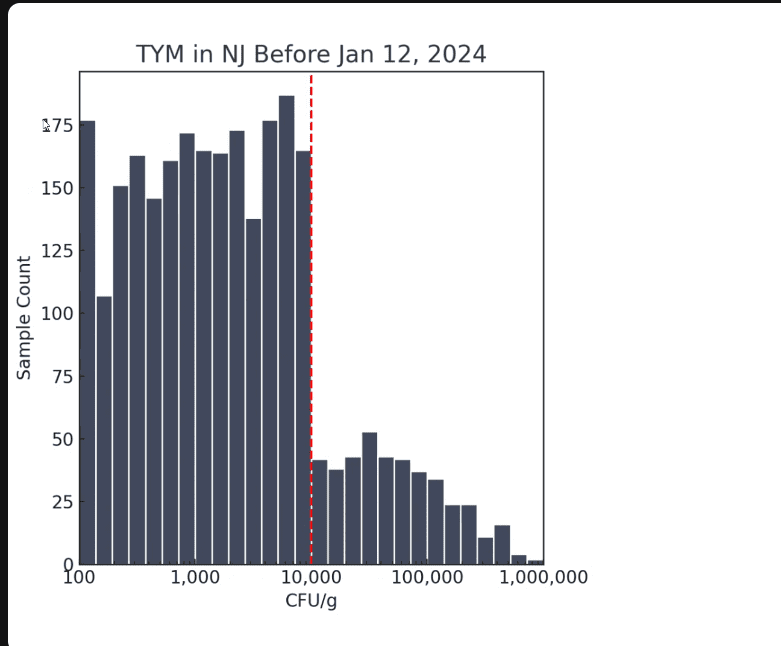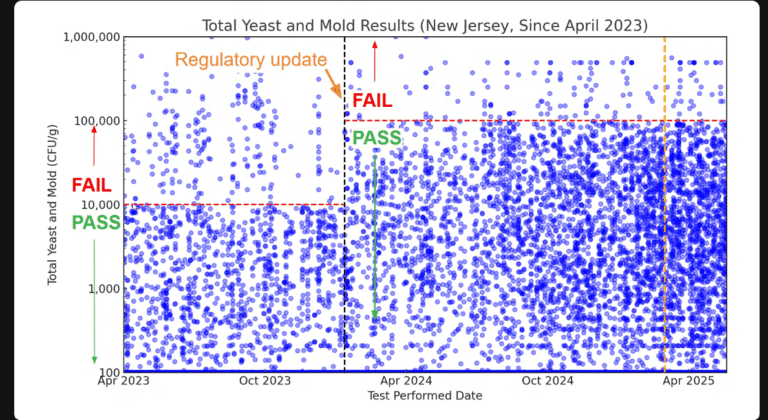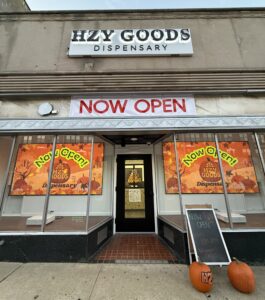A review of lab testing data from several states traces significant patterns of legal cannabis sold with high levels of mold, yeast, and inflated THC levels.
Table of Contents
MCR Labs Co-founder Yasha Kahn believes some operators seemed to be fixing the results posted on labels.
So he started compiling a national database to get a better view of the problem.
Kahn partnered with the National Center for Cannabis Research and Education at the University of Mississippi to publicize state cannabis testing data.
New Jersey Cannabis Quality Issues
Data from the New Jersey Cannabis Regulatory Commission (CRC) is consistent with the worst national trends.
High levels of cannabis with mold, yeast, and bacteria have been issues in the legal New Jersey cannabis market for years.
Heady NJ has heard many rumors of bad cannabis products in the New Jersey market with pesticides, mold, and yeast.
Kahn is working with the Safe Leaf Society co-founders Michael Boone and Andrea Raible on raising awareness.
Kahn said he had to go through a lengthy legalistic process, which is the State’s standard procedure to get Jersey cannabis data.
“States with bad data don’t want people to see this. New Jersey is one of them,” he declared.
Whistleblowers often fear the negative consequences of speaking the truth.
Not Naming Names
Kahn made all his data is public. But it does not name bad actors. In the past, shady cannabis testing labs threatened him with cease-and-desist letters.
“I’m not calling out any product,” he explained.
So, he is deliberately not calling out bad actors among widespread trends.
Moldy Weed Issues
Kahn explained eating a lot of mold can be harmful versus a little is all right. Humans have been eating food for thousands of years with a little mold so our bodies have learned to cope.
“However, we’ve only been smoking for the last couple hundred years. So, no evolution has happened,” he noted.
So, smoking moldy weed is especially bad for you.
“It’s very profitable to never fail for mold,” Kahn said.
He said in a grow room where there are more than 100 plants, the odds of mold go up. But if you don’t care about mold failure, you can stuff the room to make more money.
Maryland Cannabis Testing and Mold
New Jersey copied Maryland’s medical cannabis rules to set up the adult-use cannabis market.*
“If the rules were the same, you’d expect the results to be the same,” he noted.
Kahn explained he found that in Jersey, .25 of flower in 2024 data failed yeast and mold tests. In Maryland, there was a 4.8 percent failure rate.
He said that’s 19 times higher. Nationally, the failure rate is 3.3 percent.*
Tampered Results
Kahn noted that when Maryland made their testing regulations more stringent, mold seemed to grow just below the allowed limit. New Jersey seems to have the same trend.

So, it seems like the levels of mold are deliberately being noted as sufficiently low.
Kahn said that mold levels seem not to go beyond the legal limit, which seems very suspicious.
“Mold doesn’t know when to stop growing,” he noted. “This is statistically unlikely.”
THC Inflation Issues
Kahn believes THC inflation is very widespread, and bad actor labs are part of the problem. Flower with a high percentage of THC is more desired and therefore more lucrative.
Unfortunately, most cannabis patients and consumers are not familiar with cannabinoids and terpenes, which produce different desirable effects.
“In every state, THC is being manipulated,” he declared. “Labs increasing potency are increasing market share.”
“It’s much easier to sell weed at 23 percent than 16,” Kahn added.

Lab Shopping Problems
Lab shopping happens when a lab doesn’t want to properly label contaminated cannabis flower. So the cultivator finds one that will.
“That moment they change lab, the THC goes up,” he said.
Kahn said he studied one cultivator that was failing a lot of lab mold tests. So, they went to another lab, which did not fail them.
“Labs don’t want to be called out for this,” he noted.
NJ Cannabis Mold and Yeast Issues
Kahn’s national data review backs up Safe Leaf’s local, independent lab testing made public earlier this year. They reflect issues elsewhere.
“Products are likely statistically contaminated in New Jersey and Safe Leaf … confirmed it,” he declared. “It’s one of the worst in the country.”
“Our secret shopper results and national data trends confirm that cannabis product mislabeling is not occurring in isolated incidents,” Raible explained.
Punishing Shady Cannabis Testing Labs
“Regulators and policymakers in numerous states seem to understand that there are bad actors manipulating results and labels,” Kahn noted.
He explained that cannabis testing labs have been closed for fraud in the legal cannabis states of Washington and Nevada. More recently, Kahn said Oregon identified several labs inflating THC levels.
“Either all honest labs go out of business or the state intervenes,” he explained.
Kahn added that after states shut one down, other labs seem more mindful.
Addressing NJ Cannabis Issues
The CRC has indefinitely delayed NJ’s lab testing requirements updates. In early May 2025, they unapproved the new NJ cannabis testing rules issued at their February 2025 meeting. They did so after the NJ Cannabis Trade Association, which mostly represents large Multi-State Operators (MSOs), complained about the perceived burden of implementation.
The New Jersey Assembly Oversight Committee held a hearing on cannabis lab testing in mid-May, where Raible and Boone testified.
Noted NORML advocate Chris Goldstein thinks the NJ Attorney General’s Division of Consumer Affairs should oversee cannabis quality if the NJCRC will not or cannot.
“The Division of Consumer Affairs in New Jersey already handles labeling issues with most products,” he noted.
“Patients that pushed for legalization need to go back to the black market because products are unsafe,” Kahn argued.
He said New Jersey should update their regulations, fine and shut down bad actors, and issue product recalls.
Kahn also endorsed homegrow legalization.
The CRC did not respond to a request for comment by the time of publication.












